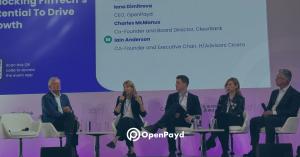OpenPayd Showcases Vision for Embedded Finance at IFGS 2025
OpenPayd was among this year’s contributors at the 2025 Innovate Finance Global Summit (IFGS) in London.
Organised by Innovate Finance, the two-day summit brought together thousands of stakeholders to discuss frontier technologies, sustainable finance, digital identity, and the regulatory evolution shaping the fintech ecosystem. IFGS has long been a barometer for the sector’s most pressing trends and innovations, and the 2025 edition was no exception. Panels, fireside chats, and keynote sessions offered forward-looking perspectives on how financial services can better serve consumers and businesses alike.
OpenPayd’s Prominent Presence
OpenPayd’s active role at the summit underscored its growing influence in the digital finance sector. As a strategic exhibitor and panel participant, the company used the event to connect with partners and industry peers, reinforce its thought leadership, and highlight its commitment to reshaping financial infrastructure through seamless, API-driven services.
At the heart of OpenPayd’s presence was CEO Iana Dimitrova, who was invited as a panelist on one of the event’s most talked-about sessions. The panel, titled "Moving Money Better: Innovations in Cross-Border Payments", explored the persistent inefficiencies in global remittances and the role fintech firms play in delivering faster, cheaper, and more inclusive financial services.
Iana Dimitrova: Championing Payment Innovation
During her panel session, Dimitrova called out the current cross-border payments ecosystem as "lacking in inclusivity and speed," especially in underbanked regions. She advocated for broader adoption of interoperable infrastructure and emphasised the need for harmonisation beyond legacy systems like SWIFT.
“There is still no single provider solving the dual challenge of access and high-quality service in many parts of the world,” Dimitrova noted. Highlighting the transformative potential of blockchain and API-powered platforms, she drew attention to OpenPayd’s efforts to bridge the global payments gap. The conversation also touched on crypto payments and embedded virtual accounts as emerging solutions, with Dimitrova outlining how OpenPayd enables faster payments for businesses through innovative infrastructure.
Her message aligned with broader IFGS themes around financial inclusion and the evolution of digital rails, resonating with both traditional institutions and next-generation fintechs in attendance.
About OpenPayd: Building the Future of Financial Infrastructure
OpenPayd is a global fintech infrastructure provider empowering businesses to embed financial services into their products and platforms. Through a single, developer-friendly API, clients gain access to a comprehensive suite of services including virtual IBANs, multi-currency accounts, local and international payment rails, and open banking capabilities.
Today, OpenPayd powers over 750 clients across fintech, marketplaces, crypto platforms, and more, with over €130 billion in annual payment volumes processed through its system. The company’s recent partnerships with firms like eToro, Wirex, and B2C2 showcase its capacity to scale quickly while maintaining regulatory compliance across multiple jurisdictions.
Its modular architecture supports a broad range of use cases—from cross-border payroll and digital asset settlements to integrated checkout experiences. With licensing in the UK, Europe, and other major markets, OpenPayd positions itself as a backbone for the new digital economy.
As the fintech landscape continues to evolve, IFGS 2025 highlighted the players that are not only adapting but leading. OpenPayd’s presence—and its CEO’s compelling advocacy for a more efficient and inclusive payments infrastructure—confirmed its place at the forefront of this transformation.
Michael Treacy
OpenPayd
email us here
Visit us on social media:
LinkedIn
Instagram
X
Legal Disclaimer:
EIN Presswire provides this news content "as is" without warranty of any kind. We do not accept any responsibility or liability for the accuracy, content, images, videos, licenses, completeness, legality, or reliability of the information contained in this article. If you have any complaints or copyright issues related to this article, kindly contact the author above.
OneIsAll Brings Peace of Mind to Summerfest Fans with Smart Pet Care Solutions
SilverTech Recognized with Industry Website Design and Development Award for Two Financial Clients
Barcelona Technology School and SNATIKA Forge Strategic Partnership to Launch Global Doctorate Programs
Kalendarium
Więcej ważnych informacji
 Jedynka Newserii
Jedynka Newserii

 Jedynka Newserii
Jedynka Newserii

Konsument

Dzięki e-commerce rośnie eksport polskich małych i średnich przedsiębiorców. Wartość ich sprzedaży na Amazon przekracza rocznie 5 mld zł
Mali i średni przedsiębiorcy coraz lepiej radzą sobie na arenie międzynarodowej, choć na razie tylko niecałe 5 proc. z nich sprzedaje swoje produkty za granicę. Duże możliwości ekspansji zagranicznej dają im e-commerce i współpraca z marketplace’ami. Za pośrednictwem Amazon w 2024 roku polskie MŚP sprzedały produkty za ponad 5,1 mld zł. Model sprzedaży sklepu umożliwia przedsiębiorcom z Polski działanie na skalę, która jeszcze kilka lat temu wydawała się zarezerwowana głównie dla największych marek
Polityka
Większość Polaków sprzeciwia się wprowadzeniu euro. Problemem może być brak dobrej komunikacji

– Polska należy do siedmiu krajów UE, które do tej pory nie wprowadziły jeszcze euro. Choć zobowiązaliśmy się do przyjęcia wspólnej waluty w traktacie akcesyjnym, nigdy nie podjęliśmy konsekwentnych działań w tym kierunku – ocenia europosłanka Nowej Lewicy Joanna Scheuring-Wielgus. W dodatku tylko co czwarty Polak jest zwolennikiem zmiany waluty. Również obecna sytuacja gospodarcza – wysoka inflacja i rosnący deficyt – nie sprzyjają dyskusji o przyjęciu euro.
Handel
Źle wprowadzony system ROP może oznaczać duży wzrost cen dla konsumentów. Podrożeć mogą produkty spożywcze

Ministerstwo Klimatu i Środowiska proponuje powierzenie NFOŚiGW zadań organizacji odpowiedzialności producenta, która w imieniu producentów będzie realizowała obowiązki wynikające z ROP w ramach zamkniętego obiegu finansowego. Przedstawiciele Polskiej Federacji Producentów Żywności i sektora odzysku odpadów ostrzegają, że może utrudnić to Polsce wypełnienie unijnych wymogów w zakresie selektywnej zbiórki odpadów, a co za tym idzie, może się wiązać z karami, a w konsekwencji – ze wzrostem cen.
Partner serwisu
Szkolenia

Akademia Newserii
Akademia Newserii to projekt, w ramach którego najlepsi polscy dziennikarze biznesowi, giełdowi oraz lifestylowi, a także szkoleniowcy z wieloletnim doświadczeniem dzielą się swoją wiedzą nt. pracy z mediami.









.gif)

 |
| |
| |
|